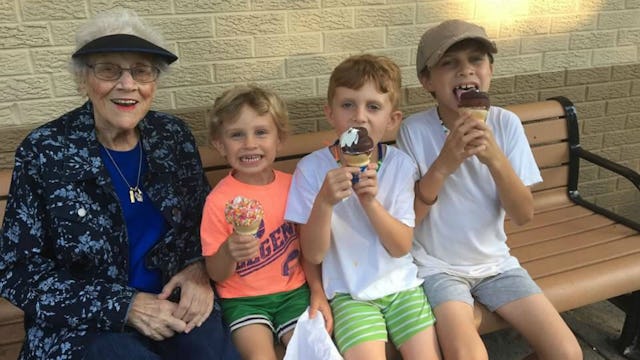Why We Talk Openly About Death In Our Family

Death is not a taboo subject in our home, and I do not pretend to shield my children from the truth about mortality. I was forced to accept the bitter reality when my father passed away shortly after my 22nd birthday. He was just 49 years old and still years away from ever walking me down the aisle or holding his future grandkids; however, my sons and I talk about him frequently, and they recognize that he is their biological grandfather.
Sometimes my boys will ask questions about my dad’s favorite foods or what sports he liked to play, and I am always quick to point out one of his favorite songs when it pops up on the radio or tell them a funny story about my childhood that highlights his fun-loving character. I have shown them pictures and even played some old 8mm tapes so they could see him in action. I long for them to recognize him, to feel like they “know” him, because that helps keep him alive in our conversations and especially in my heart. We lovingly refer to him as “Grandpop Stu,” although I will never really know what nickname my dad would have chosen to refer to himself as their grandfather.
My grandparents had longevity and were alive to meet my children, but they lived states away for the latter part of their lives and my grandfather died while my boys were still too young to remember him. We talk about him and recount the memories that he made together with the boys, but only my oldest son maintains a faint recollection of him. However, once my grandmother moved back to our area after the passing of her husband, my three sons had the opportunity to know and love her as their great grandmother “Nanny.”
She lived in a retirement community for the four years she was on her own and back in the neighborhood. The boys loved going to her house, running through the hallways, eating her snacks, and just being in her company. I loved watching them interact with her and I would reminisce about my own childhood as I watched her teach them how to play pick-up-sticks or War with her favorite deck of cards.
My boys recognized how old she was, and when we celebrated her 90th birthday, I knew better than to take her presence for granted. We were lucky to have her with us, and I continued to teach my boys to call her often, visit frequently, and appreciate the time with her because she, too, would eventually join the others in heaven.
My boys never flinched at those comments about death. They never cried, and they never doubted me. They did ask a million existential questions about heaven, God, and the afterlife. I fielded each one with care and reassured them that nobody is alone in death. Unfortunately, this past summer when Nanny fell ill at 92 years old, we had to revisit those questions multiple times. When we learned that she only had a few days left to live, I wanted my children to understand what was happening without the experience seeming too morbid to them.
My husband and I decided to allow the boys (9, 6, and 4 at the time) to see Nanny, who was still coherent at the time. While she did not look like the woman they had grown to love, she still recognized their faces and offered them some candy like always. My boys were not scared. They held her hand, drew pictures for her, hugged her goodbye, and they were fully aware that her end was near. Nevertheless, they asked to return with me each day to visit until her final time eventually arrived.
In that instance, I allowed my kids to see me at my most vulnerable. They saw me cry and mourn, and I did not shield them from the cold reality that had taken place. I do not regret my decision to include them in this life cycle event. We all found comfort in each other, and we continue to find solace while talking about Nanny and reliving the fun memories we made together.
Just the other week my middle son was in a store and pointed out a magnet that he thought Nanny would have loved. “I wish we could have bought it for her magnet collection,” he said. “Me too,” I answered with a full heart and a knot in my throat.
While I strive to shelter my kids from negativity and evil in the world, I cannot say the same for the experience of death. By accepting it and openly discussing it, my kids are recognizing their emotions and learning to handle them. They are building resiliency and coping skills, and together we are creating a memory book of our passed loved ones that will endure eternally in our minds and in our hearts. My hope is that they, too, will pass along these memories to their children and to our family’s future generations.
This article was originally published on